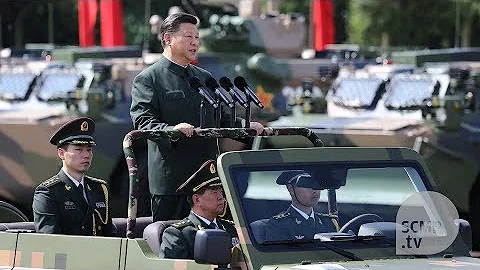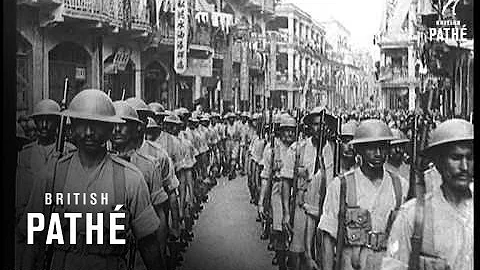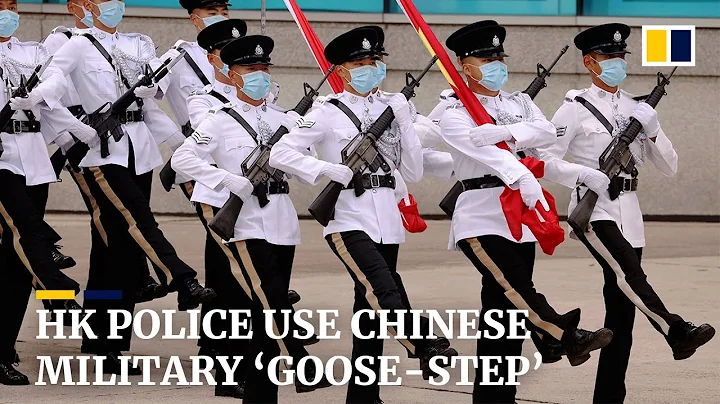Author: Aijun
Huangpu He graduated from the first phase and led the Generalissimo's armored fleet , composing a glorious legend. He also assisted Ye Ting in leading the independent regiment to win the Tingsi Bridge and Hesheng Bridge. In the torrent of the Great Revolution, Standing tall in the tide. He is the founding general-Zhou Shidi.
This article focuses on Zhou Shidi's extraordinary experience during the Nanchang Uprising and after.

Ye Ting Independent Regiment and friendly forces occupied Wuchang and defeated the most powerful enemy Wu Peifu , which also pushed the Northern Expedition to a climax. Just as the torrent of the Great Revolution swept across the country, the hostile forces in Chiang Kai-shek's army gradually revealed their true colors. On April 12 and July 15, 1927, Jiang and Wang wielded their butcher knives in Shanghai and Wuhan respectively, openly massacring revolutionary forces, and then hunted and killed our underground members across the country. The vigorous revolutionary movement died prematurely.
When the white terror of the new warlords enveloped the country, our underground members and revolutionary masses were not intimidated, conquered, or exterminated. On August 1, 1927, we decided to hold an armed uprising in Nanchang .
Before the Nanchang Uprising, Ye Ting had been promoted to commander of the 11th Army, and the independent regiment he led was stationed in Jiujiang, Jiangxi. At this time, the Independent Regiment had been reorganized into the National Revolutionary Army, and Zhou Shidi was appointed commander of the 73rd Regiment of the 25th Division of the 4th Army.
html On the morning of August 1, Zhou Shidi received a call from Li Hanhun, the commander of the 25th Division, asking him to go to the division headquarters to discuss important matters. Previously, Zhou Shidi had heard that Zhang Fakui, commander of the 4th Army, went to Lushan to attend the "bandit suppression" meeting. Now Li Hanhun had just returned from Lushan. After receiving Li's call, Zhou Shidi was very anxious because he had not yet received instructions from the organization on how his troops should act.
Zhou Shidi immediately convened a meeting with key personnel. Everyone present at the meeting was worried about Zhou Shidi being detained after going to the division headquarters, and was worried about Zhou Shidi. Fu Kezhen, commander of the first battalion, proposed that he go to the division headquarters instead of Zhou Shidi. Faced with the concern of his comrades, Zhou Shidi was very moved and said: "I have to go even if there is great danger. You should be prepared at home. If I can't come back, you must take the troops out to find the organization." "
Zhou Shidi took only one correspondent and rode from the regiment headquarters to the division headquarters. He first went to Zhang Yunyi, our underground member and chief of staff, to understand the situation. Just after saying a few words, Li Hanhun walked in. After the greetings, Li Hanhun lowered his voice and said to Zhou Shidi: "Commander Zhang appreciates you very much and wants to reuse you. I hope you will follow him and not join the wrong team."
Zhou Shidi was unmoved and said coldly Answer: "The 4th Army was able to win the battle in the Northern Expedition. Zhang Fakui's status today is due to organizational help and the heroic sacrifice of underground members. You are following Wang's 'suppression of bandits' today. This It's a dead end."
Seeing that Zhou Shidi couldn't stand it, Li Hanhun snorted and turned around to leave. At this time, a train happened to stop next to it, and Zhou Shidi went out to inquire about the news from Nanchang. In the car, he met Xu Jishen, the former second battalion commander of the independent regiment. Xu was surprised when he saw Zhou, and quietly said to Zhou Shidi: "There is an uprising in Nanchang, you should go back quickly!"
After getting this important news, Zhou Shidi immediately got out of the car, pulled the horse from the messenger's hand, and rode quickly , rushed back to the regiment headquarters. At this time, the superior organization sent Nie Rongzhen to the 73rd Regiment to preside over the uprising. Most of the troops in the
25 Division were controlled by our personnel. Therefore, the troops participating in the uprising were quickly identified, including the 73rd Regiment (formerly Ye Ting Independent Regiment), the 74th Regiment heavy machine gun company, and the 75th Regiment's three battalions. Nie Rongzhen immediately agreed on a specific uprising plan with the backbone of each regiment. If you encounter those who obstruct the uprising, resolutely attack them; if you encounter enemies who are pursuing and obstructing you, resolutely block or destroy them.
At 1 p.m., the uprising troops took advantage of their nap time to pull the team out of the station in the name of wild hunting as planned and marched to De'an . The 1st Battalion of the 73rd Regiment served as the rearguard of the entire uprising brigade. When the 73rd Regiment walked to the north of De'an Station, Zhang Fakui, Li Hanhun and others, who got the news, took the guard battalion and chased them by train. They were immediately fired upon by the 1st Battalion of the 73rd Regiment. Zhang Fakui, Li Hanhun and others were so frightened that they jumped out of the car and fled in confusion.
After Zhang Fakui, Li Hanhun and others jumped off the train, the train still moved forward and did not stop until it reached De'an Station, where it was immediately surrounded by our insurgent troops. Zhang Fakui's guard battalion in the car has five to six hundred people and is well-equipped. The insurrectionary troops asked them to hand over their guns, but they said they belonged to the general headquarters and refused to hand them over. Nie Rongzhen instructed Zhou Shidi: quickly deal with this enemy.
Zhou Shidi sent a staff officer to give an ultimatum to the guard battalion commander. Seeing that there was no way out, the guard battalion surrendered all their guns. After propaganda, some soldiers and officers joined the rebel army.
After Zhang Fakui and Li Hanhun jumped out of the car, they became "simple commanders" and stood in the field complaining to each other. Zhang Fakui asked Li Hanhun: "Where are your troops?" Li Hanhun asked Zhang Fakui: "Your guards "

The next day, the uprising force led by Nie Rongzhen and Zhou Shidi arrived in Nanchang by train. Part of the uprising troops was reorganized into the 25th Division, with Zhou Shidi as the division commander and Li Shuoxun as the representative. The original 73rd Regiment (i.e. Ye Ting Independent Regiment) was still organized into the 73rd Regiment. The three battalions of the original 75th Regiment were expanded into the 75th Regiment. Some young people who joined the team after the uprising and the original 74th Regiment's heavy machine gun company were organized into the 74th Regiment.
html On August 5, the uprising troops left Nanchang one after another. Zhou Shidi's 25th Division served as the rearguard. It was not until August 7 that they withdrew from Nanchang and marched towards Guangdong with the large forces.In order to eliminate the Nanchang Uprising troops, Chiang dispatched a large number of troops to pursue and intercept them. The enemy on the South Road has 3 divisions and 10 regiments, which are gathered in the Huichang area of Jiangxi Province. With Huichang City as the center, they have built fortifications along the Gongshui River surrounding Huichang City. About 7 regiments of the Guangxi warlords have gathered near Baiexu. area, and Huichang City formed a horn, and together they blocked the rebel army.
The pre-uprising committee decided in Ruijin to defeat the enemies in Huichang before marching to Guangdong. Early on the morning of the 24th, the Education Group, the 3rd Division of the 20th Army and the 24th Division of the 11th Army first launched an attack on the enemy. The enemy resisted tenaciously based on the favorable terrain and solid fortifications, and the battle was extremely fierce.

After Zhou Shidi led the 25th Division southward from Nanchang, he has been serving as a defender. As soon as he arrived in Ruijin, he accepted the order to attack Huichang. Zhou Shidi ordered the 75th Regiment to take the lead in attacking, seizing a hilltop with sudden movements and occupying a favorable position. After the 73rd Regiment occupied several hills in succession, they attacked several important hills north of the 2531 Highland. However, due to the enemy's strong fortifications and strong firepower equipment built in this area, they encountered stubborn resistance.
fought fiercely until the afternoon, and all departments made progress. Zhou Shidi saw at the command post that the enemy in front of him had already crossed the river and retreated. He judged that the enemy's military morale had been shaken, so he ordered the bugler of the division headquarters to blow the charge horn . Following the division headquarters' horn, the charge horns of each regiment, battalion, and company were blown one after another, shaking the entire hill. After repeated attacks, the 25th Division captured the enemy's main position. The enemy fled towards Huichang City. The 73rd and 74th Regiments quickly pursued Huichang City.

At the same time, the 24th Division also launched an attack from the west of the city. At 4 o'clock in the afternoon, our army occupied Huichang City. Qian Dajun, the commander-in-chief of the enemy's South Road, and his remnants fled in a hurry. Qian Dajun usually rode in a sedan when marching and fighting. At this time, he threw away the sedan and spread his legs to escape for his life, for fear of being overtaken by the rebels.
html On the morning of the 26th, Zhou Shidi received another order from Commander Ye Ting, Nie Rongzhen and others: the enemy reinforcements had arrived at Nanshan Ridge and were heading towards Huichang City. The 25th Division quickly attacked to the northwest of the city.The situation happened suddenly. When Zhou Shidi received the order, the gunfire was already very close. Seeing that time was running out, he asked Li Shuoxun to urge each regiment to set off quickly, and he took the special agent company to the northwest of the city to occupy positions. As soon as we climbed onto the high ground northwest of the city, we saw the enemy pressing towards this high ground. Zhou Shidi waved his hand, and the special agent company immediately rushed towards the enemy. This sudden action overwhelmed the enemy in the van.
The actions of the special agent company bought time, and the main forces of the 25th Division arrived one after another. Each time a unit arrives, it begins to occupy a position. Later, they attacked the enemy in several directions and finally repelled the enemy.
After capturing the prisoners for a first trial, they found out that the enemy was the troops of the Guangxi warlords. They didn't know that Qian Dajun had been defeated and hurried from the direction of Luokou Xu, but they didn't expect to encounter the rebel army.
After the battle in Huichang, the rebel army returned to Ruijin and entered Guangdong via Tingzhou and Shanghang. Zhou Shidi's 25th Division still serves as the rearguard of the entire army. In addition to covering the entire army, it is also responsible for covering the transportation of hundreds of sick and wounded and a large number of weapons. Soon, the rebel army arrived in Chaoshan area. The 25th Division stayed in Sanheba, , Dabu County, , under the command of Mr. Zhu.
Sanheba is located at the intersection of Meijiang, Tingjiang, Hanjiang. The 25th Division is stationed at Sanheba. If a battle breaks out, it will be a backwater battle, and the terrain is extremely unfavorable. Therefore, Zhou Shidi ordered the troops to move to the Dongwenbu, Bizhiwei Mountain, Longhukeng, and Xiacun areas on the other side of Sanheba for defense, and the division headquarters was stationed in Dongwenbu.

Just after the deployment, Qian Dajun, who was beaten away, made a comeback with 10 more regiments. The Battle of Sanheba was the most brutal battle for the Nanchang Uprising troops on their way south, and it was also the most heroic battle for Zhou Shidi's 25th Division. Many years later, those veterans who survived still shed tears when they mentioned the Battle of Sanheba.
At Sanheba, our army resisted tenaciously, repelling the enemies crossing the river again and again, and sank many ferries carrying the enemies. All the enemies on the boat were killed. There was no one at the helm and the boat was spinning around in the river. Some enemies fell into the water and drowned.
Later, the enemy concentrated many artillery and heavy machine guns and fired fiercely at our position, and finally broke through the river. Due to the overwhelming number of enemy troops, the rebel army was gradually at a disadvantage. The 3rd Battalion of the 75th Regiment, guarding the top of the mountain, under the command of battalion commander Cai Qingchuan, fought continuously for several days and nights, repelling countless enemy attacks and killing many people. The enemy will eventually run out of ammunition and food because we are outnumbered and outnumbered. After fighting hand-to-hand with the enemy, all the officers and soldiers of the battalion died heroically.
Just when Zhou Shidi led the 25th Division in a fierce battle with the enemy at Sanheba, it turned out that Chaoshan occupied by the rebels had been captured by several times the number of enemies. The fall of Chaoshan meant that the main force of the rebel army had failed. However, due to the backward communication methods at the time, Zhou Shidi and others did not know it. They still believed that holding on to Sanhe Dam was the most powerful support for the main force of the rebel army, so they remained in Sanhe. Ba fought bloody battles with the enemy.
The fierce fighting continued for three days and three nights, until Dongwenbu and Bizhiwei Mountain were occupied by the enemy. The 25th Division was surrounded on three sides by the enemy with absolute superiority. Zhou Shidi saw that if he continued to fight, the whole division might be wiped out, so he decided to withdraw from the battle.
Zhou Shidi led the retreating troops to Chaoshan, hoping to join the rebel army. Halfway through, I met the rebel officers and soldiers who had retreated from Chaoshan. I realized that Shantou and Chaozhou had been occupied by the enemy, and the main force of the rebel army had failed.
Many officers and soldiers in the uprising troops died, and the remaining troops were dispersed. Zhou Shidi and Zhu De led part of the troops to move to Jiangxi via Fujian. When they arrived at Tianxin Village, Xinfeng County, Jiangxi, the organization decided to let Zhou Shidi, commander of the 25th Division, and our representative Li Shuoxun go to Hong Kong Island and Shanghai separately, so that the troops could go to Hong Kong Island and Shanghai separately. Our organization will get in touch as soon as possible. So Zhou Shidi left the army.

At this time, our underground members were arrested and hunted everywhere. The few who survived all went underground. Some had to flee to Hong Kong Island for refuge. Many generals from the former Independence Regiment and the Nanchang Uprising, including Ye Ting, also went into exile. Hong Kong Island.
In January 1928, Zhou Shidi arrived at Hong Kong Island after several setbacks and reported to Li Lisan the situation of the Nanchang Uprising troops. Due to the long journey and hard work, Zhou Shidi contracted malaria and had to be hospitalized immediately. However, our organization on Hong Kong Island had no funds, so we had to live in Xu Chengzhang's wife's home. Xu Chengzhang was his mentor, his introduction to Huangpu, and his first captain when he was in the armored team.
Fortunately, Zhou Shidi later met his old superior Zhang Yunyi and gave him 50 yuan, so that he could be admitted to the hospital for treatment. At this time, Zhou Shidi's old friend Chen Chaopeng came to Hong Kong Island from Malaysia . He heard about Zhou Shidi's condition, and immediately visited the hospital and invited Zhou Shidi to go to Malaysia for treatment.
So Zhou Shidi went to Malaysia with Chen Chaopeng and lost contact with him.He did not know that the remnants of the 25th Division followed Zhu, Chen and others through arduous battles and reached southern Gansu. He did not know that they later went to Jinggangshan to join forces with the Autumn Harvest Uprising troops led by Chairman Mao and became the backbone of the Red Army. .
But Zhou Shidi still yearned for revolution in his heart and resolutely opposed Chiang Kai-shek. When he learned that Deng Yinda was organizing an anti-Chiang team, he immediately set off to return home. In the winter of 1929, he joined the "Huangpu Revolutionary Alumni Association" in Shanghai to confront the "Huangpu Alumni Association" organized by Chiang Kai-shek. Not long after, he was arrested by Chiang's forces. Fortunately, he was rescued by Soong Ching Ling .
In October 1933, Li Jishen, Jiang Guangnai, Cai Tingkai and others publicly raised the anti-Japanese banner and established the Fujian Anti-Japanese Organization. Zhou Shidi accidentally learned that they had the intention of contacting the Red Army, and immediately volunteered to be a "matchmaker".

Zhang Yunyi
The Red Army sent two negotiators to Fujian. One was Pan Hannian and the other was Zhang Yunyi, who was his old comrade-in-arms. In addition to introducing them to the relevant situation of the 19th Route Army, Zhou Shidi also expressed to the organization the desire of the wanderers to return home. When Zhou Shidi presented a written material describing his six years of "leaving home" to his mentor Duke Zhou , Duke Zhou also sent a letter to forward to Zhou Shidi. The general idea of
's letter was: He was asked to push Cai Tingkai to come to the Soviet area. If Cai did not come, Shidi would also come. The signatures of the letter turned out to be He Long and Nie Rongzhen, both his comrades and superiors in the Great Revolution and Nanchang Uprising. Zhou Shidi's eyes suddenly became moist. It turned out that his "family" had been thinking about him.
After the Fujian Incident, Zhou Shidi and Red Army representatives went to the Soviet area in Ruijin area. Although he had rich previous combat experience, after arriving in the Soviet area, the organization only arranged for him to become an instructor at Red Army University.
Zhou Shidi is lucky. He has leaders such as Duke Zhou, Mr. Zhu, and Mr. He who can prove his identity. Later, after the Red Army's Long March arrived in northern Shaanxi, Zhou Shidi was activated and was directly appointed from the command section chief of the cadre regiment to the chief of staff of the 15th Red Army Corps. After he took office, everyone in the 15th Army Corps was very surprised at Zhou Shidi's work ability, because this "little section chief" was so familiar with this work and no one could match it.
Not long after, the Anti-Japanese War broke out in an all-round way. The Second Red Army and the Northern Shaanxi Red Army were reorganized into the 120th Division of the Eighth Route Army, and Zhou Shidi was appointed chief of staff. From then on, he worked together with his division commander He Long and political commissar Guan Xiangying for 12 years, and formed a profound friendship. Mr. He was also his great matchmaker, who arranged the marriage between him and Zhang Jian and presided over the wedding.

In the army, Zhou Shidi has always been praised as the "model chief of staff" by officers and soldiers, not because he has served as chief of staff for a long time, but more importantly because he is knowledgeable and knowledgeable. He is a military strategist who can combine enthusiasm and coldness, rationality and sensibility. He has written hundreds of thousands of words in total. "On Several Issues in Guerrilla Warfare on the Plains" and other works that have been preserved intact to this day are all valuable military writings.

In May 1948, Zhou Shidi served as deputy commander and chief of staff of the First Corps of the North China Military Region, assisting Xu Xiangqian in commanding the Jinzhong Campaign. This campaign created the greatest victory over a large number with a small number in the history of our army's war, and was notified and commended. After the liberation of Taiyuan, Zhou Shidi was appointed commander and political commissar of the 18th Corps, and accompanied He Long and Liu and Deng's army to liberate the southwest. After the liberation of Chengdu, he served as the first mayor of Chengdu. When the War to Resist US Aggression and Aid Korea broke out, the headquarters quickly established the Air Defense Command. As the candidate for the commander of the air defense force, the chairman selected Zhou Shidi, who was then the deputy commander of the Southwest Military Region.
In 1955, Zhou Shidi was awarded the rank of general. When he was the acting commander of the Ye Ting Independent Regiment, Mr. Lin was just a trainee platoon leader of the regiment, and Xu Guangda was a company commander of the regiment.
[Deeply delve into the history of war, promote positive energy, welcome contributions, private messages will be replied]





















